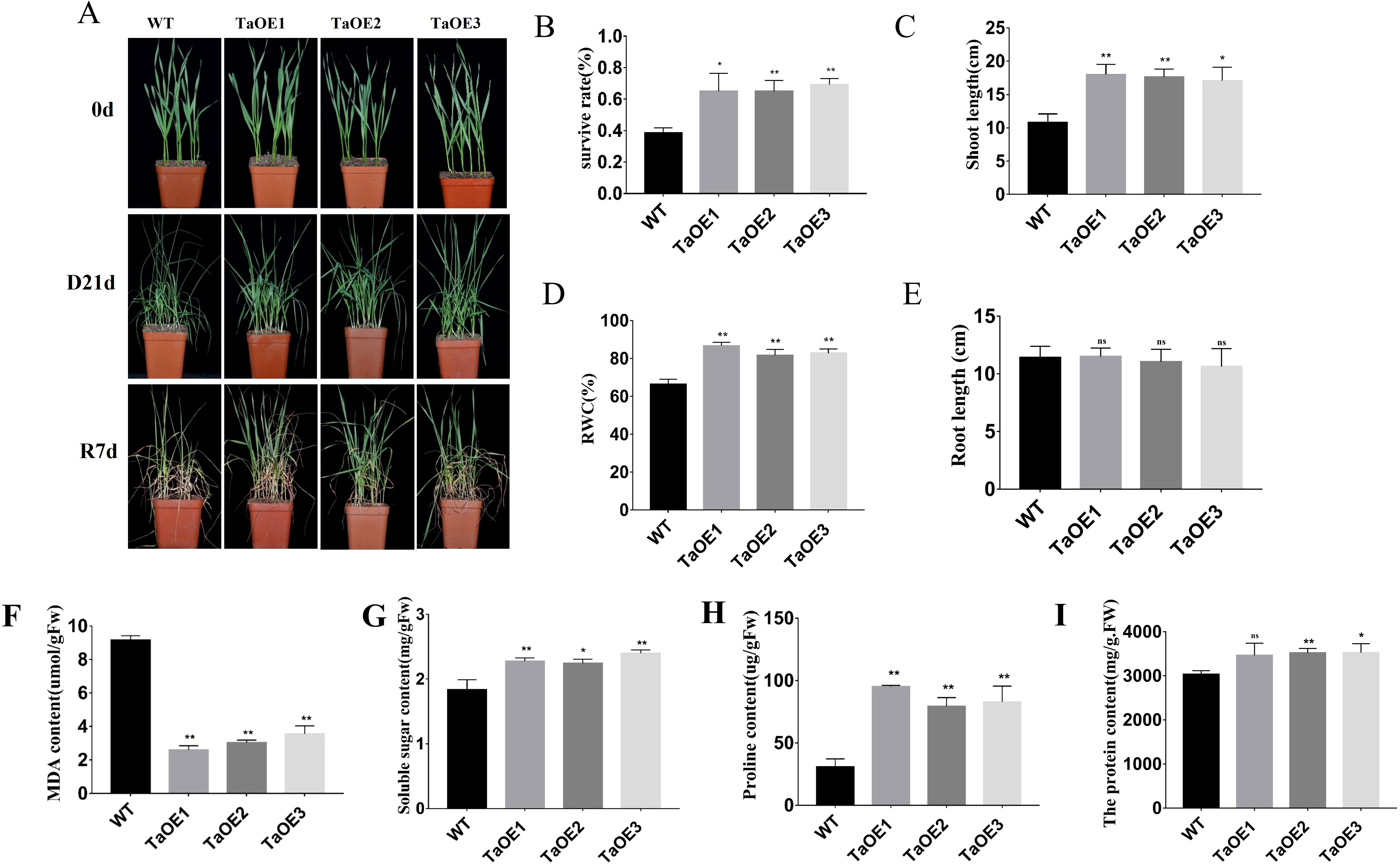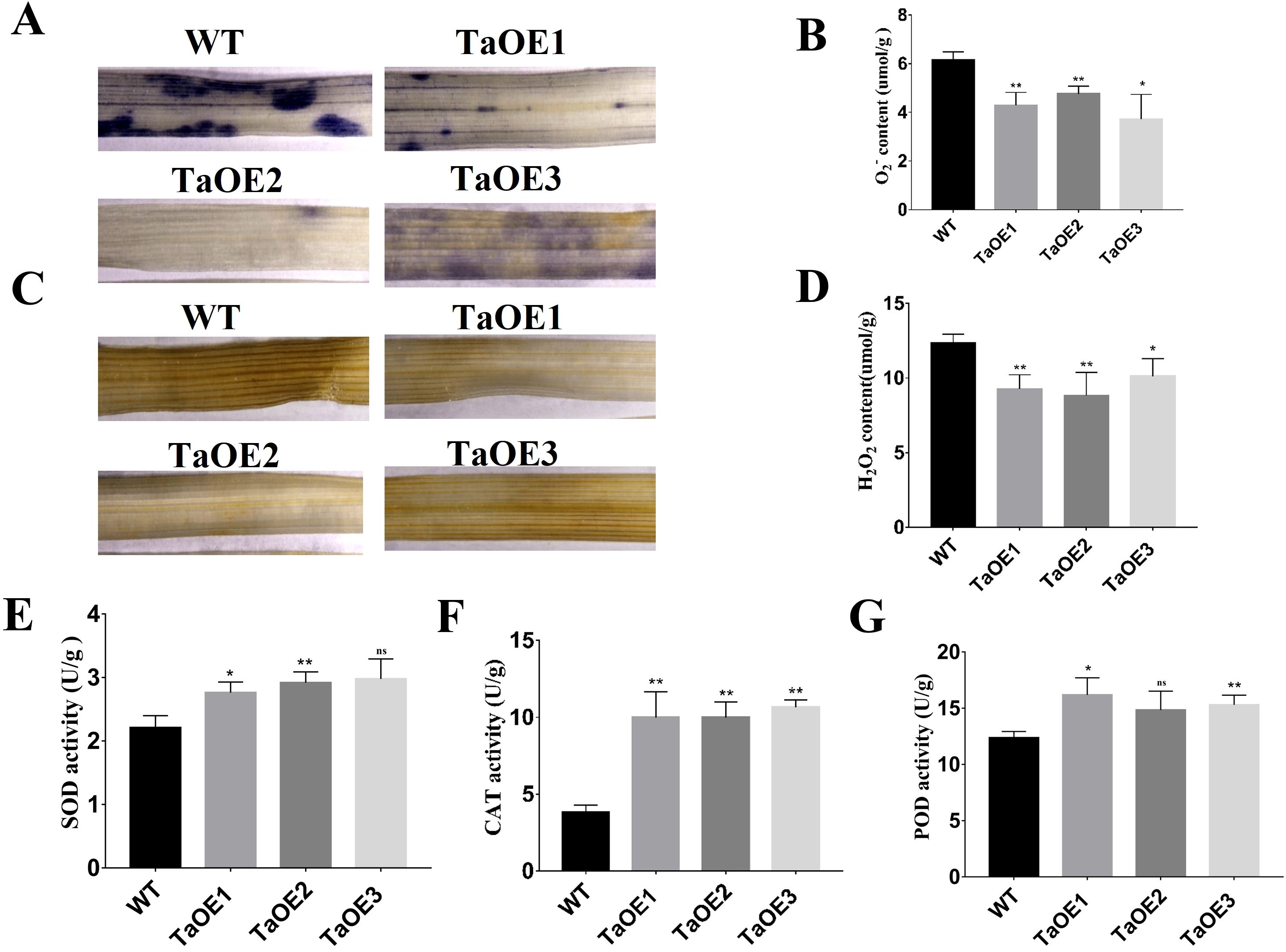
95% of researchers rate our articles as excellent or good
Learn more about the work of our research integrity team to safeguard the quality of each article we publish.
Find out more
CORRECTION article
Front. Plant Sci. , 13 March 2025
Sec. Plant Abiotic Stress
Volume 16 - 2025 | https://doi.org/10.3389/fpls.2025.1565141
This article is a correction to:
Comparative transcriptomic analysis and functional characterization reveals that the class III peroxidase gene TaPRX-2A regulates drought stress tolerance in transgenic wheat
By Su P, Sui C, Niu Y, Li J, Wang S, Sun F, Yan J and Guo S (2023) Front. Plant Sci. 14:1119162. doi: 10.3389/fpls.2023.1119162
In the published article, there was an error in Figure 6A, Figure 7C as published. In Figure 6A, the representative photo of TaOE2 was duplicated and used as TaOE3 at 0 day. In Figure 7C, the representative photo of TaOE2 was duplicated and used as TaOE3. The corrected Figure 6A and its caption “Figure 6 TaPRX-2A overexpression increased the drought tolerance. (A) Phenotype of TaPRX-2A-overexpressing transgenic and WT wheat (the cultivar “KN199”) with drought treatment. (B) Survival rates of TaPRX-2A-overexpressing transgenic lines and WT wheat. (C) shoot length of TaPRX-2A-overexpressing transgenic lines and WT wheat. (D) Relative water content (RWC), and (E) root length. (F) MDA content of TaPRX-2A-overexpressing transgenic lines and WT wheat. (G) soluble sugar content of TaPRX-2A-overexpressing transgenic lines and WT wheat. (H) proline content, and (I) soluble protein content of TaPRX-2A-overexpressing and WT plants. All experiments included three replicates and the data present the mean ± SD. *P < 0.05 and **P < 0.01 indicate a significant difference compared with WT.” and the corrected Figure 7C along with its caption “Figure 7 Analysis of ROS scavenging capacity andantioxidant enzymes activity in transgenic wheat lines. (A) Detection of O2− generation by NBT staining and O2− content (B). (C) Detection of H2O2 accumulation by DAB staining and H2O2 content (D). (E) Detection of SOD activity in TaPRX-2A-overexpressing transgenic lines and WT wheat. (F) Detection of CAT activity in TaPRX-2A-overexpressing transgenic lines and WT wheat. (G) Detection of POD activity in TaPRX-2A-overexpressing transgenic lines and WT wheat. All experiments included three replicates and the data present the mean ± SD. *P < 0.05 and **P < 0.01 indicate a significant difference compared with WT.” appear below.

Figure 6. TaPRX-2A overexpression increased the drought tolerance. (A) Phenotype of TaPRX-2A-overexpressing transgenic and WT wheat (the cultivar “KN199”) with drought treatment. (B) Survival rates of TaPRX-2A-overexpressing transgenic lines and WT wheat. (C) shoot length of TaPRX-2A-overexpressing transgenic lines and WT wheat. (D) Relative water content (RWC), and (E) root length. (F) MDA content of TaPRX-2A-overexpressing transgenic lines and WT wheat. (G) soluble sugar content of TaPRX-2A-overexpressing transgenic lines and WT wheat. (H) proline content, and (I) soluble protein content of TaPRX-2A-overexpressing and WT plants. All experiments included three replicates and the data present the mean ± SD. *P < 0.05 and **P < 0.01 indicate a significant difference compared with WT. The “ns” presents “no differences”.

Figure 7. Analysis of ROS scavenging capacity andantioxidant enzymes activity in transgenic wheat lines. (A) Detection of generation by NBT staining and content (B). (C) Detection of H2O2 accumulation by DAB staining and H2O2 content (D). (E) Detection of SOD activity in TaPRX-2A-overexpressing transgenic lines and WT wheat. (F) Detection of CAT activity in TaPRX-2A-overexpressing transgenic lines and WT wheat. (G) Detection of POD activity in TaPRX-2A-overexpressing transgenic lines and WT wheat. All experiments included three replicates and the data present the mean ± SD. *P < 0.05 and **P < 0.01 indicate a significant difference compared with WT. The “ns” presents “no differences”.
The authors apologize for this error and state that this does not change the scientific conclusions of the article in any way. The original article has been updated.
All claims expressed in this article are solely those of the authors and do not necessarily represent those of their affiliated organizations, or those of the publisher, the editors and the reviewers. Any product that may be evaluated in this article, or claim that may be made by its manufacturer, is not guaranteed or endorsed by the publisher.
Keywords: transcriptomics, drought tolerance, class III peroxidase, TaPRX-2A, ROS
Citation: Su P, Sui C, Niu Y, Li J, Wang S, Sun F, Yan J and Guo S (2025) Corrigendum: Comparative transcriptomic analysis and functional characterization reveals that the class III peroxidase gene TaPRX-2A regulates drought stress tolerance in transgenic wheat. Front. Plant Sci. 16:1565141. doi: 10.3389/fpls.2025.1565141
Received: 22 January 2025; Accepted: 20 February 2025;
Published: 13 March 2025.
Edited and Reviewed by:
Luisa M. Sandalio, Spanish National Research Council (CSIC), SpainCopyright © 2025 Su, Sui, Niu, Li, Wang, Sun, Yan and Guo. This is an open-access article distributed under the terms of the Creative Commons Attribution License (CC BY). The use, distribution or reproduction in other forums is permitted, provided the original author(s) and the copyright owner(s) are credited and that the original publication in this journal is cited, in accordance with accepted academic practice. No use, distribution or reproduction is permitted which does not comply with these terms.
*Correspondence: Peisen Su, cHNzdTIwMTRAMTYzLmNvbQ==; Shangjing Guo, Z3Vvc2hhbmdqaW5nQGxjdS5lZHUuY24=; Jun Yan, eGluc2luaWFuMjAwNkAxNjMuY29t
Disclaimer: All claims expressed in this article are solely those of the authors and do not necessarily represent those of their affiliated organizations, or those of the publisher, the editors and the reviewers. Any product that may be evaluated in this article or claim that may be made by its manufacturer is not guaranteed or endorsed by the publisher.
Research integrity at Frontiers

Learn more about the work of our research integrity team to safeguard the quality of each article we publish.